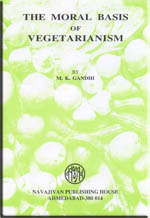
P.O. SEVAGRAM, DIST.WARDHA 442102, MS, INDIA. Phone: 91-7152-284753
FOUNDED BY MAHATMA GANDHI IN 1936
Towards New Education

THE MORAL BASIS OF VEGETARIANISM
Written by :M. K. Gandhi
Table of Contents
- Food Values
- Unfired Food
- Vital Need for Research
- Vegetarianism
- Not An End in Itself
- The Moral Basis of Vegetarianism
- Our Daily Diet
- Minimum Diet
About This Book
Written by : M. K. Gandhi
First Edition :10,000 copies, 1959
I.S.B.N :81-7229-122-1
Printed and Published by : Jitendra T. Desai
Navajivan Mudranalaya,
Ahmedabad - 380 014,
India.
© Navajivan Trust, 1959
Download
Chapter-3: Vital Need for Research
The unlimited capacity of the plant world to sustain man at his highest is a region yet unexplored by modern medical science which through force of habit pins its faith on the shambles or at least milk and its by-products. It is a duty which awaits discharge by Indian Medical men whose tradition is vegetarian. The fast developing researches about vitamins and the possibility of getting the most important of them directly from the sun bid fair to revolutionize many of the accepted theories and beliefs propounded by medical science about food.
Young India, 18-7-1929
I have found after prolonged experiment and observation that there is no fixed dietetic rule for all constitutions. All that the wisest physicians claim for their advice is that it is likely to benefit in a given case as in a majority of cases they have found it to answer fairly well. In no branch of science is the scientist so hampered in his research as in the medical. He dare not speak with certainly of the effect of a single drug or food or of the reactions of human bodies. It is and will always remain empirical. The popular saying that one man’s food may be another’s poison is based on vast experience which finds daily verification. Such being the case, the field for experiment on the part of intelligent men and women is limitless. Laymen ought to acquire a workable knowledge of the body which plays such an important part in the evolution of the soul within. And yet about nothing are we so woefully negligent or ignorant as in regard to our bodies. Instead of using the body as a temple of God we use it as a vehicle for indulgence, and are not ashamed to run medical men for help in our effort to increase them and abuse the earthly tabernacle.
Young India, 8-8-1929
Take up any modern textbook on food or vitamins, and you would find in it a strong recommendation to take a few edible green leaves uncooked at every meal. Of course, these should always be well washed half a dozen times to remove all dirt. These leaves are to be had in every village for the trouble of picking. And yet greens are supposed to be only a delicacy of cities. Villagers in many parts of India live on dal and rice or roti, and plenty of chilies, which harm the system. Since the economic reorganization of villages has been commenced with food reform, it is necessary to find out the simplest and cheapest foods that would enable villagers to regain lost health. The addition of green leaves to their meals will enable villagers to avoid many diseases from which they are now suffering. The villagers’ food is deficient in vitamins; many of them can be supplied by fresh green leaves. That, of course, means elaborate research and examination in detail of the nourishing properties of the innumerable leaves that are to be found hidden among the grasses that grow wild in India.
Harijan, 15-2-1935